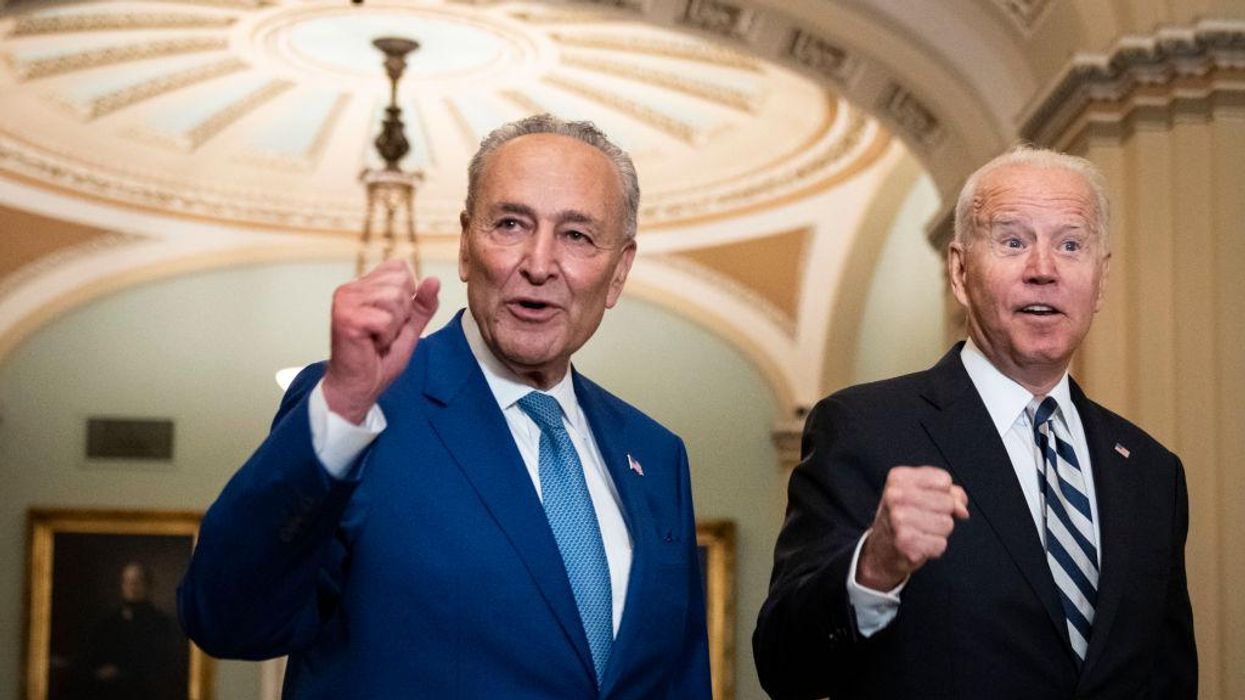
Drew Angerer/Getty Images

Senate Democrats have put forward an infrastructure proposal that is "wildly out of proportion to what the country needs right now," Senate Minority Leader Mitch McConnell (R-Ky.) said Wednesday.
McConnell's comments come the day after Democrats came to an agreement on a $3.5 trillion budget reconciliation package that will address President Joe Biden's so-called "human infrastructure" priorities. These policies including expanding Medicare, free community college tuition, national paid family leave, extending Biden's revamped child tax credits, and various climate change policies watered down from the Green New Deal.
"Every major program that President Biden has asked us for is funded in a robust way," Senate Majority Leader Chuck Schumer (D-N.Y.) told reporters at a news conference announcing the plan Tuesday.
The $3.5 trillion bill will advance in the Senate along with a $1.2 trillion bipartisan deal for "hard infrastructure" — funding for roads, bridges, and other projects traditionally thought of as infrastructure improvements. There are two "infrastructure" bills because Republicans would not support a broad spending package costing upwards of $4 trillion, but the White House badly wanted to have a token bipartisan agreement to show the American people.
As a compromise, Democrats decided to split their priorities, using a dual track strategy to advance parts of an infrastructure package Republicans might find acceptable in one bill and advancing the other via budget reconciliation, a process that lets them overcome a GOP-led filibuster and advance spending-related bills with a simple majority vote.
"We are very proud of this plan. We know we have a long road to go. We're going to get this done for the sake of making average Americans' lives a whole lot better," Schumer said.
Negotiations were fraught for weeks and it remains uncertain whether Democrats will ultimately be able to send either bill to President Biden's desk.
McConnell's remarks reflect how Republicans may be preparing to walk away from the bipartisan agreement because Democrats are demanding it be paired with the $3.5 trillion reconciliation package. Speaking on the Senate floor Tuesday, McConnell slammed Democrats for proposing trillions of dollars in new spending as inflation rises at the fastest rate seen since the 2008 financial crisis.
"Just this morning we learned that runaway inflation is continuing to hit working American families and hit them hard. Consumer prices spiked in June considerably more than had been forecast. Inflation is up 5.4 percent year-on-year, the fastest jump in about 13 years. Stunningly, it's up 0.9 percent just month over month," McConnell said.
"What Democrats say they want to force through this summer through reconciliation would make our current inflationary mess look like small potatoes," he warned.
Republicans and economists all warned that Democrats\u2019 last massive spending spree would hurt Americans. Sure enough \u2014 runaway inflation. And they want an even bigger socialist sequel this summer?https://apnews.com/article/business-prices-consumer-prices-7c0dceffdbd50a8b1b888af5d3b922ed?utm_source=Twitter&utm_campaign=SocialFlow&utm_medium=AP\u00a0\u2026— Leader McConnell (@Leader McConnell) 1626187240
If Republicans kill the bipartisan deal, Schumer would still have the option of combining the two bills and passing all $4.1 trillion of Biden's infrastructure priorities in one budget reconciliation package. But the real problem for Democrats are internal divisions within the party.
The democratic-socialist Senate Budget Committee chairman Bernie Sanders (I-Vt.) and many of the most progressive members of the House Democratic conference had hoped for a more expansive $6 trillion bill — for many of them $3.5 trillion is not enough spent. But moderates in the Senate, namely Sen. Joe Manchin (D-W.Va.) would not support spending so much and Democrats in a 50-50 Senate could not afford even one defection from the reconciliation package.
Sanders ultimately agreed to the $3.5 trillion compromise once it included Medicare expansion, but other progressives in Congress are dissatisfied. Sanders reportedly held a call to brief lawmakers with Rep. Pramila Jayapal (D-Wash.), a leading progressive in the House. Together they informed progressives that the deal would not include all of their priorities, leading at least one lawmaker to say "many in the squad and squad adjacent will vote no."
One progressive reacting to news tn: \n\n"This is a capitulation by progressives as just yesterday Sanders and Jayapal did a call saying it absolutely has to be higher than $3.5 trillion, and this is before Manchin extractions. Many in the squad and squad adjacent will vote no."— Annie Grayer (@Annie Grayer) 1626231692
As progressive support remains in doubt so too does moderate support. Manchin remains noncommittal until Democrats put forward a plan to fully fund their priorities.
"I think everything should be paid for. We've put enough free money out," Manchin told reporters.
In a statement on the $3.5 trillion deal, Manchin reiterated that he is "very interested in how this proposal is paid for" and said he will reserve judgment until he's had the opportunity to read the bill.
My statement on the Senate Budget Committee's $3.5 trillion infrastructure package:pic.twitter.com/qstcR85flP— Senator Joe Manchin (@Senator Joe Manchin) 1626271409
The "deal" achieved is very much in limbo, which is why Biden is scheduled to meet with Senate Democrats Wednesday to rally support for the agreement.
".@potus looks forward to attending the Senate Dem Caucus lunch today to continue making the case for the duel [sic] track approach to build the economy back better by investing in infrastructure, protecting our climate, and supporting the next generation of workers and families," White House press secretary Jen Psaki tweeted Wednesday.
.@potus looks forward to attending the Senate Dem Caucus lunch today to continue making the case for the duel track approach to build the economy back better by investing in infrastructure, protecting our climate, and supporting the next generation of workers and families.— Jen Psaki (@Jen Psaki) 1626260758